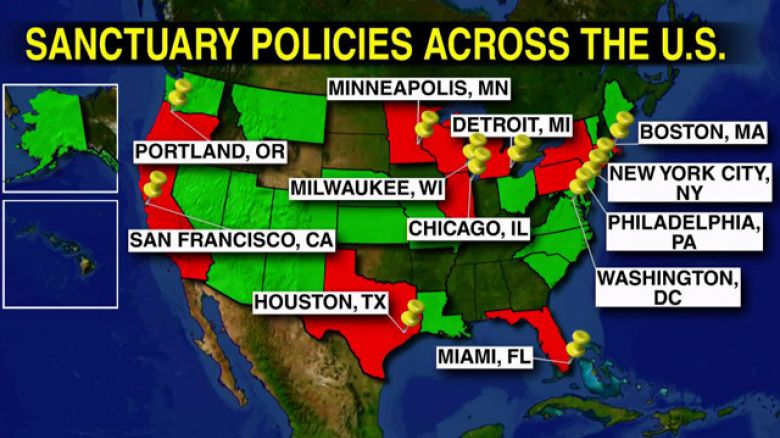By Natalia Castro
President Donald Trump declared war on sanctuary cities in January. With Trump’s executive order defunding jurisdictions across the country that “willfully violate Federal law in an attempt to shield aliens from removal from the United States,” Trump asserted that federal law cannot be undermined by state preference. But one judge has made his preference perfectly clear as a federal district court in California on Tuesday ruled that this executive order exceeded his authority and unfairly targeted those jurisdictions, showing the bias in our courts and need for Congress to act.
Federal judge William Orrick wrote, ““Federal funding that bears no meaningful relationship to immigration enforcement cannot be threatened merely because a jurisdiction chooses an immigration-enforcement strategy of which the president disapproves.”
However, these states aren’t choosing an immigration enforcement strategy at all, they are choosing to reject any strategy from the federal government and simply allow illegal immigrants to live in their borders.
By definition, sanctuary cities choose to defy federal law and to resist the President’s policy. Cities are not picking peaceful alternatives, they are allowing illegal immigrants to live in their cities against immigration law. Law’s which has been on the books for years but Trump is finally enforcing.
Interestingly, Judge Orrick noted that “While the federal government may incentivize states to adopt federal programs voluntarily, it cannot use means that are so coercive as to compel their compliance.”
Here, Judge Orrick has a point. The main complaint with Trump’s executive order is that much of the programs being defunded were not conditioned on complying with federal immigration law. In order to be lawful, Congress must be the actor denying funds to those jurisdictions. In that manner, it can “incentivize states to adopt federal programs voluntarily.”
The states and cities need not comply, and taxpayers need not fund them via federal revenues. Nobody’s forcing them to take the money. In fact, whether this is a good thing or not, under the 10th Amendment this is a common tool for the federal government since Congress ultimately has the power of the purse.
In 2014, the Atlantic reported on the federal governments use of the Highway Trust Fund to compel states into action, arguing “If Congress were to lose the Highway Trust Fund, it would also lose a powerful tool to keep states in line… The federal government can’t force states to comply with all of its whims. But it certainly has the means to put the pressure on… Under the 10th Amendment, powers not explicitly given to the federal government are reserved for the states. But under its authority to regulate interstate commerce, Congress can threaten to withhold essential federal funding for highway infrastructure if states do not comply.”
This exact process is what created a speed limit in Montana, and it has constitutional backing; the 1987 Supreme Court case, South Dakota v. Dole, dealt with the national drinking age and ruled that under the spending clause of the Constitution the federal government could withhold highway funds to exert control over the states. Providing clear legal precedent for Congress to deny funds, while the courts are debating Trump.
Congress must use its Article I power of the purse to defund these cities in every way possible. While Trump’s orders are moving through the court process, Congress should show their support for federal law and defund cities refusing to comply with federal law enforcement in identifying and detaining illegal immigrants. This is after all, a process they have done many times before.
Undoubtedly, the left will hold Trump’s immigration orders in California’s federal courts for years, as we have already seen with the 9th district court decision on Trump’s travel ban. Judges in liberal areas are seeking any reason to delay Trump’s orders, Congress should show their solidarity and reinforce Trump’s aim.
Federal Judge Orrick used the rhetoric of Press Secretary Sean Spicer as a justification for voting against Trump’s executive order, biased judges must be rooted out of the court system. Until then, Congress is responsible for following through on Trump’s agenda and reminding cities there is no sanctuary from federal law.
Natalia Castro is a contributing editor of Americans for Limited Government.







